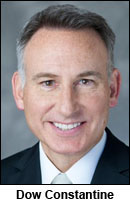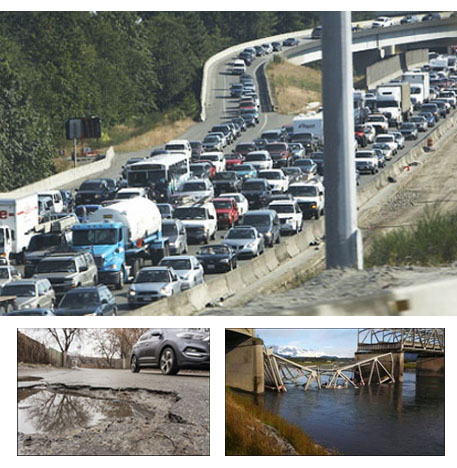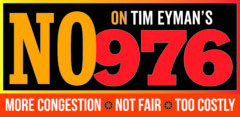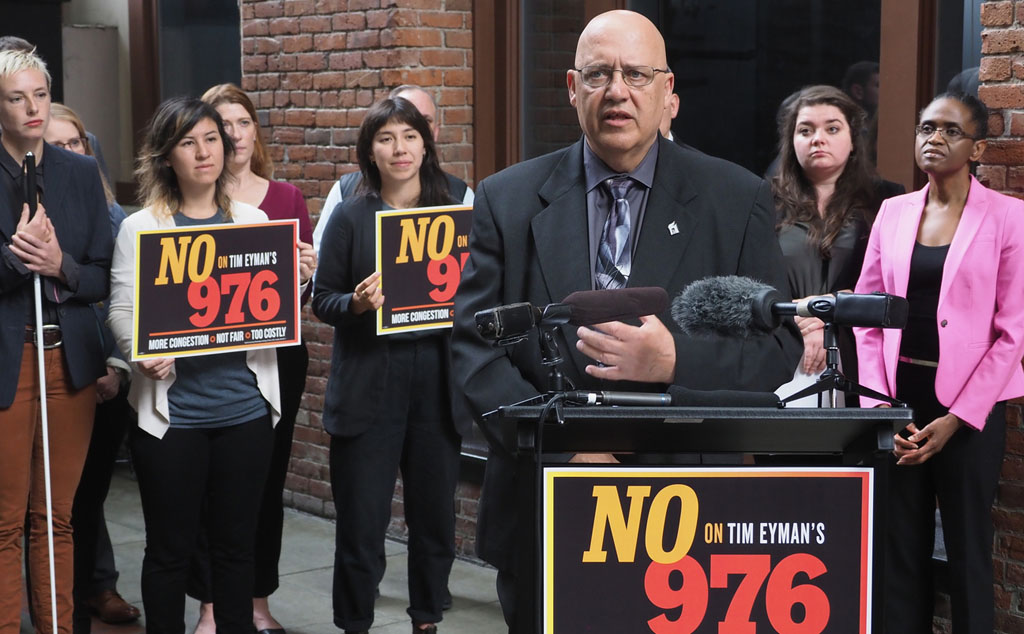ELECTION
Coalition urges Washington voters: NO on Eyman’s I-976
Needed improvements to roads, bridges, overpasses, transit services, street maintenance all threatened by funding cuts imposed by I-976
SEATTLE (Sept. 19, 2019) — Business, labor, civic, environmental and transit organizations from across the state have come together to fight I-976 and protect the state’s transportation system. Seattle leaders came together on Wednesday to speak out about I-976, which would repeal billions in transportation investments at the state and local level, threatening road and transit projects across the state.
Right when our growing state needs to invest in roads, bridges, rails, and transit options, this initiative reduces city-level maintenance projects, threatens voter-approved regional transit investments, and cuts billions from the state transportation budget. I-976 would cut transportation services for veterans, senior citizens and people with disabilities and funding for the Washington State Patrol.
“Every day, I’m reminded of how much Washington state jobs are dependent on our strong transportation system,” said Larry Brown, President, Washington State Labor Council AFL-CIO. “We need freight corridors and transit options to get goods to market, but we also need them to build houses and universities and provide services like health care and public safety. People all over the state complain about long commutes; I-976 will make that situation worse—for decades. It threatens our long-term economic stability and our quality of life. We can’t risk another decade or two of having our roads and bridges fall apart. Vote No on I-976.”
 “King County and the Puget Sound region are fueling Washington State’s economy. To do that, we need more investments in transportation solutions that will keep our workers, families, and businesses moving — not another bad idea from Tim Eyman,” said King County Executive Dow Constantine. “I-976 could eliminate thousands of hours of Metro bus service, delay light rail construction, and force people to sit in more traffic. Voters must reject I-976.”
“King County and the Puget Sound region are fueling Washington State’s economy. To do that, we need more investments in transportation solutions that will keep our workers, families, and businesses moving — not another bad idea from Tim Eyman,” said King County Executive Dow Constantine. “I-976 could eliminate thousands of hours of Metro bus service, delay light rail construction, and force people to sit in more traffic. Voters must reject I-976.”
 “Seattle residents deeply support expanding our transit options, not cutting them. I-976 will have a catastrophic impact — it will hurt our regional investments in Sound Transit and threaten 350,000 bus hours in Seattle, impacting tens of thousands of riders,” said Seattle Mayor Jenny Durkan. “Transportation benefit districts are local dollars for local solutions, and 62 cities, including ours, depend on them as a critical transportation investment. For Seattle voters who care our light rail and bus service, we must vote no to oppose this anti-transit bill.”
“Seattle residents deeply support expanding our transit options, not cutting them. I-976 will have a catastrophic impact — it will hurt our regional investments in Sound Transit and threaten 350,000 bus hours in Seattle, impacting tens of thousands of riders,” said Seattle Mayor Jenny Durkan. “Transportation benefit districts are local dollars for local solutions, and 62 cities, including ours, depend on them as a critical transportation investment. For Seattle voters who care our light rail and bus service, we must vote no to oppose this anti-transit bill.”
“I-976 poses devastating impacts to every level of our transportation and transit systems, touching every corner of Washington State,” said Alex Hudson, executive director of Transportation Choices Coalition. “Transit connects people to education, doctor appointments, jobs, and each other – and this initiative would cut billions of dollars from transportation projects and eliminate hundreds of thousands of transit hours at a time when our people, planet, and economy need more transit, not less. Voters across Washington have supported transit investments and want more, better, and faster options to get them out of traffic and where they need to go. I-976 would cut these critical connections and trap people in gridlock with no way out.”
“Nearly 13 percent of people in Washington State have mobility-limiting disabilities,” said Anna Zivarts, program director of Rooted in Rights. “It’s not just disabled folks who are transit dependent – it’s also our youth, our elders, immigrants and people who can’t afford cars. Transit for us isn’t a choice, it’s an absolutely critical part of our ability to participate in our communities. I- 976 is a massive step backwards both on mobility access and on reducing our carbon emissions. We must defeat it.”
“Anyone who has sat for hours in traffic knows we need more investment in transportation, not less,” said Microsoft President Brad Smith. “This is a major quality of life issue for every resident of our region and our state. I-976 would be a step in the wrong direction.”
 I-976 also puts at risk important maintenance and improvements needed for road safety. Our state already has 160 bridges that are identified as being in poor condition and a threat to public safety. Even smaller road projects, like potholes, contribute to dangerous driving conditions. Cuts to mass transit options will only put more people on the road, making congestion worse and causing further damage to roadways. There are state, regional and local projects at risk:
I-976 also puts at risk important maintenance and improvements needed for road safety. Our state already has 160 bridges that are identified as being in poor condition and a threat to public safety. Even smaller road projects, like potholes, contribute to dangerous driving conditions. Cuts to mass transit options will only put more people on the road, making congestion worse and causing further damage to roadways. There are state, regional and local projects at risk:
- State transportation funding is spent on highway safety improvements, freight mobility projects, transit services and the Washington State Patrol;
- Regionally, I-976 would cut $20 billion of voter-approved funding for Sound Transit, delaying light rail and bus rapid transit expansion. I-976 also threatens $119 million of King County Metro services (2020-2025), including $15 million in vanpool improvements.
- In addition to putting state funding at risk, I-976 threatens local transportation projects across the state. More than 60 cities would lose an average of $60 million a year for the next 10 years; transportation benefit districts (TBDs) provide:
- $36 million a year to Seattle, which is used to fund more than 350,000 bus service hours
- $919,000 a year to Des Moines
- $834,000 a year to Shoreline
- $767,000 a year to Burien
- $376,000 to Mercer Island
- TBDs collect local money to solve local problems. Local funding for street and traffic maintenance such as pavement repairs, crack sealing, lane stripping, street lighting, signals, and pedestrian improvements such as crosswalks, ADA ramp work, and sidewalk repairs.
I-976 puts at risk more than $25 billion in critical transportation funding, at the state, regional and local level. Right when our growing state should be investing in roads, bridges, rails, and transit options, this initiative reduces city-level maintenance projects, threatens voter-approved regional transit solutions, and cuts funding for the state transportation budget.
These funding cuts will hurt the state’s transportation system for decades, as neglected projects snowball and become harder, and more expensive, to fix.
 A broad coalition of organizations have come together to protect Washington’s transportation system by defeating I-976. Business, labor, civic, environmental and transit organizations have joined the No on I-976 effort, and are working hard to help the public understand that I-976 cripples the ability of every community to fix roads, expand light rail, maintain ferries and improve freight corridors.
A broad coalition of organizations have come together to protect Washington’s transportation system by defeating I-976. Business, labor, civic, environmental and transit organizations have joined the No on I-976 effort, and are working hard to help the public understand that I-976 cripples the ability of every community to fix roads, expand light rail, maintain ferries and improve freight corridors.
For more information about at-risk projects and the coalition, visit www.NO976.org.
ALSO at The Stand — The high cost of Tim Eyman’s Initiative 976 (by David Groves, Sept. 6)






